- Home
- Susan Beth Pfeffer
The Beauty Queen Page 2
The Beauty Queen Read online
Page 2
Mom scooted up, knocking a couple of people over in her enthusiasm. Mom has a real gift for that.
“Look at that, folks,” Mr. Davis said. “Like mother, like daughter. Aren’t they a lovely pair?”
Mom beamed. I looked at Mom and wondered why they were applauding.
“One more question, and then we’ll let you mingle with your subjects,” Mr. Davis said. “Any boy friends, Kit?”
“One,” I said. “This week.”
“Did you hear that?” Mr. Davis said. “I tell you, Great Oaks is honored to have such a beautiful and clever winner. And now, go and meet the people.”
I took that as a hint for me to walk around to the other side of the lake. Mom was clutching on to my arm, otherwise I would have swum. It seemed a pity not to use my brand new bathing suit for something practical.
“Here, please,” the photographer said. “Now smile big for the camera.”
I smiled big.
“And one with your mother,” he said.
Mom smiled bigger.
“Congratulations,” Sharon said. I hoped she wouldn’t cry. I congratulated Laura, who kissed me on the cheek.
“Kit, over here,” some woman said. “I’m Sheila King. You probably don’t remember me.”
“Of course I do,” I said. “You review plays for the paper. What are you doing here?”
“Color,” Sheila said. “The reporter who was supposed to come got sick at the last minute. Look, I’d love an interview with you. ‘Local beauty, combines rare looks with rarer talent.’ How about tomorrow?”
“Sure,” I said. “Thanks for remembering my talent.”
“It would be hard to forget it,” she said. “I still get goose bumps when I think about your Anne Frank.”
“Thank you,” I said. “You’ve just made my evening.”
“Tomorrow,” she said. “After lunch sometime.”
“Great,” I said. “See you then.”
“Did you hear that?” Mom said. “I told you this would be a gold mine of publicity. Oh, Kit, I’m so excited and so proud of you. This has been the most wonderful evening of my life.”
“I’m glad,” I said. “Mom, I have to change.”
“Of course. You must be freezing. There’s such a breeze tonight.”
“I’ll see you later,” I said, careful not to say how much later. I ran my way through some more congratulations and changed into my dress. Then I went out the back door and walked quickly to the turn-the-other-way bar.
Chapter 2
Marly was lying in bed, reading by a flashlight, when I finally got in. I undressed quickly, admiring the shadow effect in the room. It looked a lot better in darkness than it ever did with light. There were two beds, left over from my parents’ original bedroom set; a chest of drawers which held both our things; a crowded closet; one desk, which Marly used; and one small bookcase, pretty much all Marly’s. I used a single shelf of it for my plays. Marly felt guilty about the room, but since she spent much more time there than I did, it made perfect sense to me that she should use most of the space. I was rarely home, and when I was, I was usually in the living room. Marly was more of a hider.
“You missed a great scene,” she said, after I got into my bed.
“What happened?” I asked.
“Mom came home absolutely furious because you’d disappeared …”
“I did not disappear,” I said. “I left. There’s a world of difference.”
“Not to Mom there isn’t,” Marly said. “I’d invited Dad and Sally in after graduation. He is my father, after all, and she’s his fiancée.”
“You don’t have to convince me.”
“Mom walked in, really mad, and I thought you’d lost the contest, so I said something like ‘too bad’ or ‘better luck next time,’ so she started shouting that I was a lousy ingrate kid, only slightly better than my no-good older sister, and it was no wonder, since we both took after the rottenest man ever to cross her path, and then she looked into the living room and saw Dad and Sally. Sally looked like she was going to die right there, and she hardly knows Mom.”
“It doesn’t take long to realize what a gem she is,” I said.
“So Mom turns to me and asks what Dad and his floozy are doing there. She really did say floozy, and you know me when I’m nervous, so I started giggling, and that didn’t help matters any. And Dad got indignant and said he was allowed to visit his daughters, and Mom said something about his support checks always being late, and Sally asked what support checks, which Mom thought was very funny. So Mom ordered Dad out, on account of it was past my bedtime, and Sally very innocently asked how you had done, and Mom said you won, in between a few obscenities, and I acted really surprised because I was. The way she was carrying on, I thought you’d come in last, or got kicked out of the contest for morals or something.”
“They didn’t think of it,” I said. “Otherwise they probably would have.”
“So I said something really bright like ‘no kidding,’ and Mom said some more things on the subject of family loyalty, and Sally said she really did have to get going, and Dad said he’d see us tomorrow, and they left. And I came up here, on the pretext of doing homework. Mom was so upset she didn’t even question it.”
“She will tomorrow,” I said. “She always thinks of things the day afterward.”
“It was awful,” Marly said.
“How did Sally seem?”
“Okay,” she said. “Friendly. Dad really seems to like her.”
“He liked Mom once.”
“I don’t think so,” she said. “At least, I don’t see how he could have.”
“Mom was very pretty,” I said. “Before she put on all that weight.”
“Speaking of weight, I think I’m going to go on a diet,” Marly said. “Lose weight this summer before I start high school.”
“That’s a good idea,” I said. Marly had inherited Mom’s tendency to flab, and although I knew she tried to keep it under control, there were times when she had to diet to get back to normal. Dad and I were slim, which annoyed Mom. Still, fat girls didn’t win beauty contests.
“Congratulations,” Marly said. “On winning I mean.”
“Thanks,” I said. “It was a farce.”
“Were any of the girls there really pretty?”
“Probably,” I said. “I was too busy shivering to notice. It gets cool there at night.”
“Are you proud?”
“No,” I said. “Do you think I should be?”
“No,” she said. “But sometimes people get proud of really dumb things.”
“I’m proud of my acting,” I said. “And that I graduated high school, even though I never liked it. And I’m proud of you. That’s about it.”
“Twenty pounds,” Marly said. “If I could lose twenty pounds, I’d be really thin.”
“You’d be invisible,” I said. “Ten pounds will do you fine.”
“I want to be really good-looking when I start high school,” she said. “I’ll never be as pretty as you, but I’d be pretty enough, I think.”
“I’ll never be as smart as you,” I said. “Why compete on those levels?”
“That’s easy for you to say,” Marly said.
“It is not,” I said. “I always wished I could do as well in school. You know how I crammed for tests and how I worried.”
“You would have done a lot better if you hadn’t been so busy acting.”
“I never would have done as well as you. I’m not as smart as you are. That’s a fact.”
“If you say so,” Marly said. “There are times when I’d swap brains for a good complexion and a nice figure and red hair.”
“Auburn,” I said. “I won with my auburn hair.”
“Mom must have loved that.”
“I don’t know,” I said with a giggle. “I left before I had a chance to discuss it with her.”
Dad called me up the next morning to congratulate me and to say he was sorry he couldn�
�t have been there. He asked when the county contest was, and when I told him, he said he’d make a point of being there. I told him he didn’t have to, but he said he wanted to be there when they crowned me Miss Harrison County. So I said okay and wished him luck with Sally. He said we’d have more of a chance to talk the next time he was in town. I said I hoped so, and we hung up. Then Mom grumbled at me some for leaving her, and I said we’d just gotten separated in the crowd, which was a lie, and she knew it. But she decided to forgive me.
“You’ll need an evening gown for the county competition,” she said.
“What?”
“An evening gown. The kind of things girls wear to their senior proms.”
“We’re not going to discuss that again,” I said.
“Of course not,” Mom said. “I made it perfectly clear then what I thought of a girl who would turn down three invitations from perfectly nice boys, when even her boy friend wouldn’t have objected if she’d gone, just because she didn’t feel like it.”
“We had a performance that night,” I said. “At the theater, in a show I was in. It would have been a little hard for me to get out of it.”
“You know perfectly well they would have canceled the performance if you’d asked them to,” she said. “Not to mention the whole subject of your priorities. Now here are three nice boys, smart, with money, and good families, asking you, begging you, to go to the prom with them, and you think acting is more important. Acting. It’s a sickness with you.”
“You should know,” I said. “Mental illness is one of your strong points.”
“What’s happened?” Mom asked. “You’ve changed your ambitions suddenly? Now you’re going to be a stand-up comic?”
“One stand-up comic is enough for any family, Mom,” I said. “Besides I thought we weren’t going to discuss the prom again.”
“I wasn’t discussing,” she said. “I was simply telling you you’re going to need an evening gown, and it’s a real pity you didn’t go to the prom because then you’d already have a dress, and now you’ll have to get one.”
“I would have had to get one for the prom,” I said.
“It would have gotten worn more if you’d gone.”
“Can we afford an evening gown?” I asked.
“If we have to, we can,” she said. “It’s an investment. You know Miss Harrison County gets five hundred dollars, and all she has to do is appear at a few functions and enter the state contest. And for that they give her five hundred dollars.”
“In money or scholarships?” I asked.
“I don’t know,” she said. “I didn’t ask. Besides what difference does it make. You could use both.”
“Maybe I should get a job this summer,” I said. “They need someone at the bakery on Houston Street.”
“You’re not going to work at a bakery,” Mom said.
“Why not?”
“Because it wouldn’t be right for Miss Great Oaks to be a common salesgirl. What if the county judges heard?”
“They’d probably think it was very noble of me. Besides, I don’t have anything else to do this summer. The theater’s just doing musicals.”
“So why not be in a musical? Aren’t they good enough for you?”
“Mom, I sing like a bullfrog. And my dancing’s not much better.”
“I’m sure that’s not my fault. I was willing to continue your dance lessons. You were the one who said no.”
“They were a waste of money. I wasn’t getting anything out of them.”
“Maybe if you hadn’t dropped out, you could be in musicals.”
“What’s so great about musicals?”
“I don’t know,” Mom said. “And I don’t know what’s so great about acting, either, but you seem to see something in it. And besides—”
“Oh great,” I said. “I can hardly wait to hear what this besides is going to be.”
“Only that you’re going to need something for the talent competition. If you’d kept up with your dancing, maybe you could have done a little dance. They always like that on the national contests, when girls do dances.”
“Talent?” I asked. “I thought this whole thing was on looks alone.”
“Of course not,” Mom said. “They have to start separating the wheat from the chaff someplace, and it might as well be there. But if you sing like a bullfrog and dance like a toad, I suppose you’d better forget all about it.”
“Mom, lots of people have said lots of things about me in my life, but nobody’s ever said I lack talent. I’ll do a monologue from something.”
“Monologues never win,” she said. “Dances win. Songs win. Ventriloquism wins. Monologues and baton twirling never do.”
“How about gymnastics?” I asked.
“Gymnastics? I didn’t know you could do gymnastics.”
“I can’t,” I said. “I was just wondering.”
“Don’t wonder,” she said. “Just realize you can’t get up there and recite the lyrics to one of those silly songs you keep playing and think you’ll get anywhere. These are very intelligent people, and they’ll expect to see something really good before they give away any five hundred dollars.”
“I’ll remember,” I said.
“And remember you’ll need an evening gown,” Mom said. “See if you can borrow one from a friend.”
“I’ll see,” I said. “As a matter of fact, I’ll go right now and check.”
“You’re always running away from me,” Mom said. “Has that ever occurred to you?”
“Mom, if we keep talking, you’ll be late for work.”
“I’ll get to work on time,” she said. “I just wondered if you knew you were always running away from me.”
“It’s occurred to me,” I said. “I’ll see you tonight.”
It was too early to visit anybody, so I went to the bakery, but they’d already filled the job. I wasn’t disappointed, although it would have been fun to embarrass my mother. I went to the library and skimmed over some plays, trying to decide what speech to do. While I was there, I read a couple of magazines. Then, when it was late enough, I went to Greg’s house.
Greg’s mother opened the door with her typical suspicious expression. Greg’s mother doesn’t approve of me, and I don’t blame her. All of her suspicions about me are accurate, except one. She thinks I’m out to marry Greg, and I’m not. Not that Mom would object. Greg’s just the kind of boy she’d like for an instant son-in-law. His father’s a dermatologist; his mother a member of every respectable organization in town. He has one sister, who got married last year, right after her graduation from college, to a nice young boy, who went to Princeton and majored in good manners. Obviously, the right sort of people.
Greg, fortunately, shared my attitude on marriage. You couldn’t say I was opposed to marriage. It was just that I’d never seen a good one. Greg claimed he had, but it was one out of ten, or maybe twenty, depending on the mood he was in. So we were perfect for each other.
“I think Greg’s asleep,” his mother said.
“I’ll wake him,” I said.
“You will not,” his mother said. “I’ll see if he’s awake.”
“Thank you,” I said and made myself as comfortable as I could in the living room. I’d never seen a room which hated me quite as much as that one did. It was everything our living room wasn’t. For starters, it was clean. Everything shone. There was a white overstuffed chair that was still white, and an off-white leather couch that was supposed to be off-white, and the glass-and-chrome coffee tables shone. None of the plants had dead leaves, and instead of imitation Dresden shepardesses there were a few tasteful antiques. The paintings on the walls were real—framed originals. I often worried about how much of that room had worked its way into Greg’s blood.
“Hello,” he said, a couple of minutes later. He was fully dressed, and shaved, so I had the feeling his mother had been a little off. “Congratulations.”
“How did you hear?” I asked.
; “Lynn called me this morning and told me. You made front page of the Clarion. Right where they usually put the latest accident picture. There you were, according to Lynn. I haven’t had a chance to see the paper yet. You should have let me know.”
“About the contest? I was embarrassed enough without having friends there. Besides, my mother was there to cheer me on to victory.”
“Lynn’s very upset. Claims you’re setting women’s lib back twenty years.”
“So I sold my body for fifty dollars,” I said. “I can use the money. Besides, I didn’t think I’d win.”
“Well, you did,” he said. “Does this mean you go on to bigger and better things?”
“Bigger, yeah. Probably better too. The county contest.”
“Miss Harrison County,” Greg said. “Objectively, you’re very pretty. And you have a good body.”
“Thank you,” I said. “But the same thing’s true of a hundred girls in Great Oaks alone. Your sister for instance. She looks much more like the beauty contest type to me.”
“Never,” he said. “First of all our parents would never permit it. And anyway she’s too short.”
“I have to show off some talent,” I said.
“Do the hula,” he said. “Girls who do the hula always do well.”
“Only if I did it topless,” I said.
“Oh yeah,” Greg said. “That would go over well.”
“Actually,” I said, “I thought I might do a little acting.”
“No kidding,” Greg said. “Acting?”
“How does Mary Tyrone’s final speech in Long Day’s Journey grab you?”
“It grabs me fine,” he said. “But I think it would be a little ostentatious.”
“I was afraid you’d say that.”
“Something light,” Greg said. “But meaningful. Maybe the Declaration of Independence.”
“Are you kidding? I don’t want to be arrested as a communist.”
“You’re probably right,” he said. “Sure the hula’s out?”
“Absolutely,” I said. “Also baton twirling, singing, and gymnastics.”
“Anne Frank then. Some selections from her diary.”
“That’s not a bad idea,” I said. “Hokey, but meaningful.”

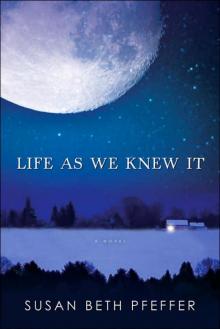 Last Survivors 01 - Life as We Knew It
Last Survivors 01 - Life as We Knew It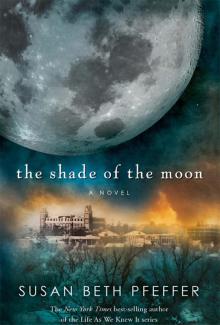 Last Survivors 04: Shade of the Moon
Last Survivors 04: Shade of the Moon Thea at Sixteen
Thea at Sixteen Kid Power
Kid Power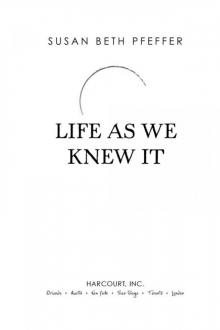 Life as We Knew It
Life as We Knew It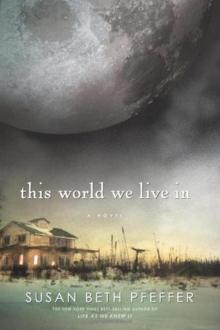 This World We Live In
This World We Live In Meg at Sixteen
Meg at Sixteen Blood Wounds
Blood Wounds The Beauty Queen
The Beauty Queen Most Precious Blood
Most Precious Blood The Dead and the Gone
The Dead and the Gone Sybil at Sixteen
Sybil at Sixteen Evvie at Sixteen
Evvie at Sixteen Getting Even
Getting Even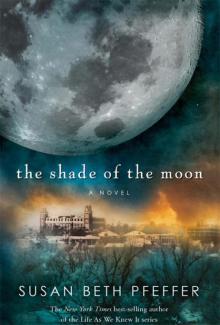 Shade of the Moon ls-4
Shade of the Moon ls-4 The Dead and Gone
The Dead and Gone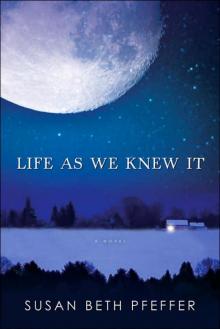 Life As We Knew It lawki-1
Life As We Knew It lawki-1 Fantasy Summer
Fantasy Summer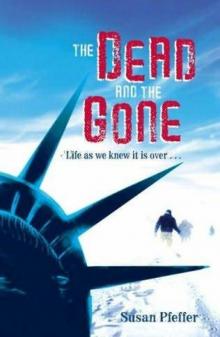 The Dead and the Gone ls-2
The Dead and the Gone ls-2 This World We Live In ls-3
This World We Live In ls-3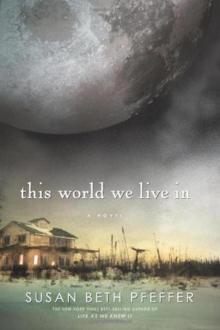 This World We Live In (The Last Survivors, Book 3)
This World We Live In (The Last Survivors, Book 3)